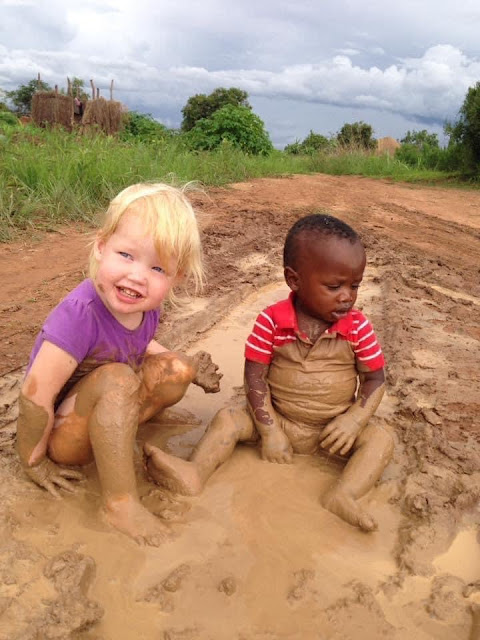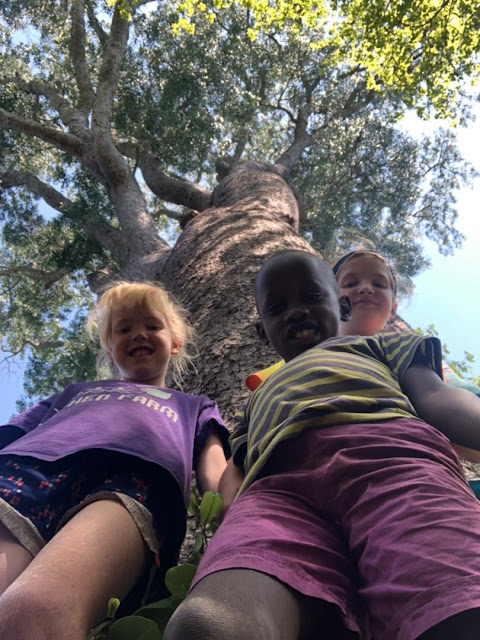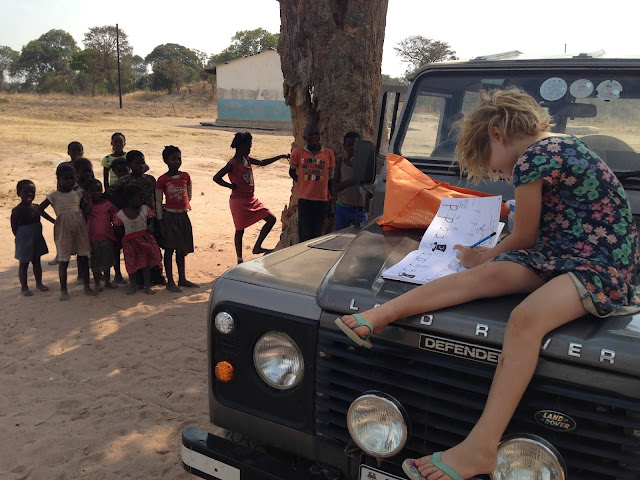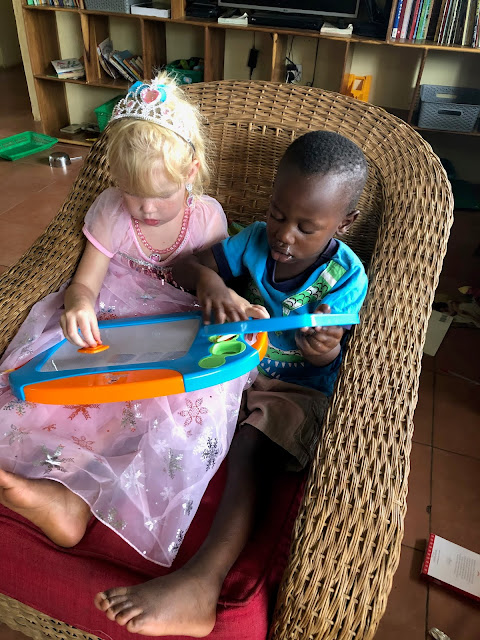I rolled my eyes when Jeremy said, “You’ve got to watch this episode of Bluey.” I knew he had been binge watching the cartoon, and he knew I think cartoons are dumb. Bluey is an Aussie cartoon, brilliant for its portrayal of child development, parenting and social-emotional skills. I’m glad my kids watch it – they certainly have picked up some creative and healthy habits from it. But the day Jeremy curated a watch list for me was the first time I appreciated it for myself.
The episode he started me on had to do with the dog mom, Chillie, trying to get her pups Bluey and Bingo out the door for a play date. They were delaying and being very age-appropriate (annoying) and their mum was trying to explain to them the importance of keeping their word and keeping time. As happens in many episodes, the kids as their mother “why?” a few million times. The climax of the episode was delivered through one such “why?” dialogue regarding why they needed to do what their mother was directing them to do, and it went like this:
Bluey and Bingo: “Why?”
Mum: “Because I want you to have a lovely little childhood.
Bluey and Bingo: “Why?”
Mum: “Because I want you to have a lovely little adulthood.”
Bluey and Bingo: “Why?”
Mum: “Because I want you to have a lovely little life!”
Those three consecutive phrases… a lovely little childhood… a lovely little adulthood… a lovely little life… stopped my heart from beating for a full three seconds. My resonance with Bluey and Bingo’s mom was so profound in that moment that I just stared at the screen while tears trickled down my cheeks. I turned to face my husband who (by the way) has spent 15 years of movie nights asking me the question, “What do you want to watch?” and 15 years hearing the answer, “Anything that won’t make me cry.” He knows my philosophy – that I cry frequently enough over real life, and therefore don’t need my entertainment to torture me too. He gave me a knowing smile, and just said, “See?” And I couldn’t even be mad that he had broken our movie night vow by giving me the one genre I strategically avoid.
“I want you to have a lovely little life,” perfectly summed up both my greatest desire and my greatest fear for our children.
Parenting has been an emotional gauntlet as of late – which is the main reason why the blog has been so quiet in this season. I haven’t been able to find words for what’s been happening or why this role of being mom has been so impossibly hard. I’ve cried far more frequently and far more easily than I can remember in years past, and it finally landed on me via Bluey’s mom that the tears are because I want more than anything for our kids to have a lovely little life, and I fear more than anything that I’m failing to give it to them.
Six months ago we enrolled Bronwyn in a boarding school seven hours from our house. To say it’s been “an adjustment” for all of us is far too understated. Yes, we’ve had to get used to her absence; we’ve had to practice calling her every night for the shortest five minutes ever, asking her about her day and learning to hear her heart during those sped up convos. We’ve had to accept driving 1,000 miles round trip every three weeks just to soak in a hug. But the true hardship for me personally is that I – the mother who carried her heartbeat next to mine for 9 months, and who fed her from my own body, and who loves her more than life itself – have had to excise a chunk of my own heart to to give her this opportunity.
Our reasons for this season of boarding school are nuanced and many. The long-story-short is that the village wasn’t working for her anymore: It wasn’t working socially, academically, spiritually or personally and she knew this earlier and more intensely than either Jeremy or I did. As her social network grew older and more self aware, the gap between their similarities and differences grew to be a cavern. Bronwyn felt the tension of having to suppress important parts of herself – language, values, principles, emotions – in order to achieve acceptance. She was extremely adept at code-switching, but constantly doing so was wearing down her sensitive heart and she directly asked for a change. We knew enough other families who have sent or currently send their children to boarding school that we started talking to them all about the pros and cons. To Bronwyn this was a no brainer – she saw boarding school as an opportunity burst the village bubble, to be herself and develop friendships in a classroom environment that felt more suited to her English-as-a-first-language needs. She wanted sports and adventure and meaningful relationships… and we just wanted our daughter in our home. But we listened to her desires and we listened to her needs and ultimately decided that our our parental desire to have her with us 24/7/365 was far outweighed by the needs of the journey she was undeniably on.
And so we sent her. And I cried all day, every day, for nearly a month. But eventually her nightly reports of how much she missed us evolved into reports of how she was enjoying life too much to miss us and while my heart still ached, the tears fell less and less. The hole in my heart created by her absense started to heal, not by filling it with other things to replace her but with the knowledge that my baby was again living a lovely little childhood. Bearing witness to her process, I could see that her present circumstances had the very real possibility to shape her into a lovely little adult, and my hopes for her having a lovely little life granted me enough happiness and comfort to keep going.
And so it went, for half a year, while we carried on with relative ease… Until the younger two started talking about boarding school too. There is a three year age difference between Bronwyn and the next child, and a four year gap between her and the baby of the family. I thought I had minimum three years left before the idyllic, free-range childhood of the village started to lose its magical charm for the next two. Furthermore, when I took into account personality differences amongst the three, I had reason to hope that while Bronwyn left for school at 9, that I might actually be able to keep the other two at home – safe, and sound – for much longer. But those personality differences actually seemed to be working against – and not for – my unrealistic dream of keeping my babies with me until college. As much as Bronwyn’s absence had affected me, it had created a heartache for Leonie that she couldn’t contain. Dominic’s FOMO had been kicked into hyper drive and he was mad that he wasn’t having the same experiences as his sister. Furthermore, while Bronwyn’s picturesque, “bush-baby experience” had given us rose-colored glasses regarding childhood in the village, her absence let us see more clearly (through the eyes of the other two) the harsher realities of village life. As we listened to the twins debrief their days, we realized how much they were encountering not just the highs but also the lows of their environment. Without big sister and her leadership skills acting as a buffer for them, they were still climbing trees and digging in the dirt and playing soccer and making banana babies… but they were also witnessing day drunkenness, and domestic abuse and fielding sexual advances from kids not that much older than them. They felt caught between wanting to fit in, but also not understanding the drastic difference in values and priorities of their friends and their family. Bronwyn navigated those waters a bit better at their age (chock full of moxy as she is) and yet with her no longer at the helm, the babies were seriously struggling to steer the ship. For months, we coached, we guided, we prayed, we parented, but their frustration, confusion, hurt – and most of all, resolve to join their sister – deepened.
It felt like I had only just found peace regarding our decision to let Bronwyn go, and yet the turn of events that had us talking about sending the other two as well was quite literally more than my heart could bear. At the ripe age of 39 I was having a full-blown, early-onset, mid-life crisis. I agreed that our current life was not working for the six and seven year olds, but I just kept saying their ages… six and seven… and couldn’t cope with trying to put those tiny numbers into the same sentence as ‘boarding school.’ We’ve called them collectively “the babies” since they were actually babies and what kind of mother allows her babies to leave home so early in their precious little lives?
No. This can’t be ok. I can’t conceive of it. They are babies. They can’t. I can’t.
My options were either to sit paralyzed in my pit of despair, or to do the work needed to get some clarity. As we had done with Bronwyn, we tackled the pros and cons of allowing the babies to join their sister away at school. Fairly quickly, we observed that the pros outweighed the cons. Not quite as obviously as had been true for big sister B, but enough that we couldn’t shut the door on the possibility. The more we talked to them, the school, other parents of boarders, and former boarding school attendees, the more evidence was stacked onto the “pro” side of the scale. As time went on, the “cons” list grew shorter and shorter for the kids (and their dad) until we found ourself moving forward with the process of enrollment. With a January start-date drawing closer and closer, I found myself growing more and more forlorn. I was following our family’s mutually agreed logic and could see the list of positives fairly objectively. But the pending loss of having three fourths of my heart cut off from me was too painful to bear. Sure, ‘lack of proximity to my precious babies’ might have been the only thing weighing down the “cons” side of the scale, but it was a million-pound anchor nonetheless. I just kept circling back to that all-consuming thought – six and seven year olds need to be with their mother. And I was utterly failing to move on from there.
That thought – and the sick feeling of losing my babies – was inserting itself into every moment of every day of my otherwise satisfying life. As I would train teachers and meet with parents at the school I run, I’d think, “How is educating 400 Fimpulu kids worth it if I lose my own?” As I would make house calls and do wound care, I’d think, “How is all the healing in the world important if my babies aren’t with me?” As I would be called upon to teach and lead groups and make grand and glorious plans for the flourishing of everyone around us, I couldn’t help but think, “How is any of this God’s best for my life if it happens at the expense of my children?”
I couldn’t reconcile it. The thoughts, the feelings, the logic, the pros, the cons, the future – it was all this black hole of insanity that made me feel very much like I was losing my grip. My attempts at gaining clarity through the opinions of others was more or less futile. The advice I was receiving about what to do with my children, how to approach my work, how to feel about everything in life managed to create the most un-correlated scatter plot ever. Gathering opinions was factually interesting, and I did appreciate being known and seen, but emotionally, it only ushered in more entropy than before. My coping was at an all time low, and persisted so long that I felt robotic; neither happy nor sad – just numb. How can this be ok? How will it be ok? What if it’s never ok again? What if I’m never ok again?
I appreciate Brene Brown for many things, not the least of which is the way she has reframed her own emotional breakdown as being a “spiritual breakthrough.” I was experiencing something similar, where those depressive feelings were pulling into play the body’s wisdom of slowing down, turning inward, and creating space for the most fundamental question of human existence: What is most important here? I asked it out loud, again and again, working very hard to differentiate between my rabid maternal instincts and the actual communications of my soul. Somewhere in the process, I remembered Bluey. Lovely little life…
I too want to have a lovely little life… and I can’t imagine doing that without my kids under my roof… but is that impossible? Could I be ok so long as they too were having a lovely little childhood? Even if it meant letting go of what that might look like?
This was the million dollar question: What does it mean – for me personally – to have a lovely little life? Could I answer that question more honestly for myself and for my children if I were to put the maternal impulses on pause long enough to find my footing in the answer?
I knew I couldn’t answer the question without clarifying first what was important to me. I had known, from the beginning of my downward spiral that I felt like I was betraying an age old ‘family-first’ value, but I also knew it wasn’t the only value carrying weight in our present circumstances.
To help move the plot along (and in hope of finding peace) I went on a journey of parceling out not only the logistics of how sending our kids away might be good (or bad,) but also what values were impacting the way I perceived this impossible decision.
Desperation will lead you to do some funny things, so I fully accept the cheezyness of my self-help, but I decided to do a tactile values sort activity in order to get a visual representation of how I was really answering the ‘lovely little life’ question. I knew that sending our kids away was distressing because it was violating a deeply held value, but wondered whether I could name the values that made boarding school a good thing too.
I used very google-able, prefab values cards to parcel all my thoughts into three categories: those that are important to me, those that are not really important to me and those that are very important to me.
I did a first run through, laying everything out on the table – a symbolic action of trying to get all my thoughts and feelings OUT to where I could quite literally face them. After that initial sort, I did a little shuffling to achieve better congruence between thoughts, feelings and current decisions, I made a few distinctions. Amongst those things that aren’t important to me, I realized there were certain things that really didn’t have to matter, but that I didn’t mind receiving, so long as they didn’t jeopardize any greater value. Similarly, I realized that there were certain things that were clearly important to me but that I could let go of, and cognitively let them be “less important,” if they needed to be, in service of an even higher value. And finally, I realized that there are certain things that are very important to me, but are also not as important as some of the other values which are ultimately MOST important. Seeing them in the very important category, but separate and distinct from the rest of the very important things looked and felt right.
‘Living according to ones values’ is truly just jargon. Depending on who taught you about such things, “living according to your values” may very well have been communicated as living as your authentic self, being who you were made to be, walking in the spirit or even following God. Often the expression of these values is unspoken, but they are certainly there, and our kids are taking cues from us. Children learn from their families of origin what kind of life is worth living based on the stories they watch their parents live. Our value-formation matters to them. Not only that, but helping our kids to have a ‘lovely little childhood’ involves helping them determine their own very important values and conferring upon them the courage they will need to act accordingly.
A ‘lovely little childhood’ depends on mom and dad living congruently in a way that models what it looks like to do hard things in service of those higher values. Jeremy and I want them to know that family is very important, and that we love them to the moon and back, and that a whole host of important values guide and direct our very important family life. As a family, we value service… and adventure. We care for others… and we connect deeply amongst ourselves. When family values stand in conflict, we manage the tension – together – as a way of learning and growing. As we string those values together into statements of reason and response for why boarding school is good and right for our children, I still tear up at the thought of sending them, but I can also talk back to the real, maternal emotions caused by the thought, ‘six and seven year olds need to be with their mother.’ By saying to myself, yes, that’s true, but equally true is the hope you have for their own personal development into responsible, brave, spiritually driven children who are learning through your example to be true to who they are.
And come January, I will cry, because its ok to be sad after making the right decision.
And Jeremy and I will figure out how to be empty nesters.
And I will remember that living for what matters is worth what it costs.
Because ultimately, this is the best any parent can do in helping their kids have a lovely little childhood… so that they too may become lovely little adults… and grow up to have a lovely little life.
Am I living from the heart God gave me??? This is my process, and I want it to be theirs. And if I can sort my own values, and live accordingly, and show them how that’s done, then I can reasonably expect that they will observe and learn to do the same, and in doing so, become the lovely little people they were made to be.

























